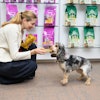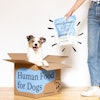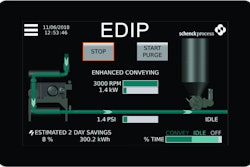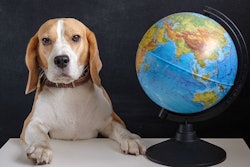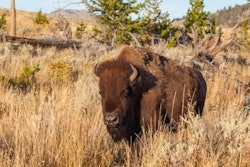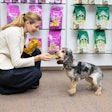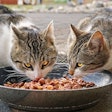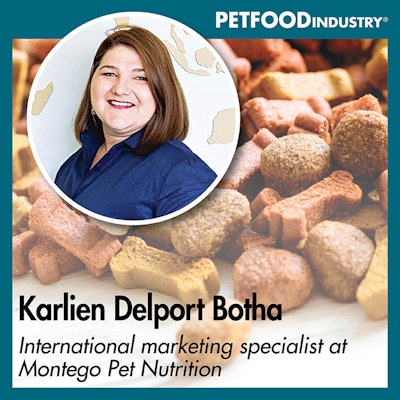
International Marketing Specialist for Montego Pet Nutrition Karlien Delport sat down with me to discuss one of the pet food industry's most interesting developing markets: Africa. We talked trends, the uniqueness of the continent and its myriad cultures, and what the rest of the pet food world needs to know about the opportunities there. Karlien and I had a great conversation. Check it out!
The below transcript is from Episode 20 of the Trending: Pet Food podcast, where I spoke with International Marketing Specialist for Montego Pet Nutrition Karlien Delport about the current state of the African pet food market. You can find the episode at www.PetfoodIndustry.com/trending-pet-food-podcast, on SoundCloud or on your favorite podcast platform. This episode originally aired on October 26, 2022.
Lindsay Beaton – Editor, Petfood Industry magazine and Host, Trending: Pet Food podcast
Hello and welcome to Trending: Pet Food, the industry podcast where we cover all the latest hot topics and trends in pet food. I'm your host and editor of Petfood Industry magazine Lindsay Beaton, and I'm here today with International Marketing Specialist for Montego Karlien Delport. Hi, Karlien, and welcome.
Karlien Delport – International Marketing Specialist, Montego Pet Nutrition
Hi, Lindsay. Thank you. Thanks for inviting me to chat with you today.
Beaton: In case you haven't had the pleasure of meeting her or are unfamiliar with Montego, here's what you need to know. Karlien has been with Montego just over three years but has been building brands across numerous African markets for over a decade. She has firm knowledge of the African market through building and supporting various large international brands and is currently exploring horizons in the fast-growing, consumer-driven pet food industry. In her current position, she's responsible for setting up a strategy and tactical plan for building the Montego brand beyond South African borders. As a well-known and well-loved local brand, Montego, being the largest independent pet food manufacturer on the African continent, has high ambitions for global expansion. The company is currently exporting to 20 different countries with territories, marketing and communications activities falling under Karlien's jurisdiction, together with brand-building activities and potential new markets.
Montego Pet Nutrition was founded in 2000, in the heart of the Karoo semi-desert area of South Africa in a town called Graaff-Reinet. Built upon a strong entrepreneurial spirit, family values and innovation, the company has never stopped improving on its approach. Today, Montego has grown from producing 65 tons a month to over 300 tons per day, and from producing just a single product to offering nine high-quality brands with over 200 individual products for a wide range of market segments and appetites.
Unsurprisingly, Karlien is here today with all her experience to help me answer this question: What's the current state of the African pet food market?
I want to be able to talk about both the South African market in particular and then reach out to the broader African pet food market, because obviously they're connected and Montego deals largely in the African market. But I want to start with South Africa. What is the South African pet food market like right now? And how does it compare to the broader African pet food market in general?
Delport: The pet food market in South Africa is really exciting, to be honest. We've seen a huge growth very similar to what the rest of the world has seen during the pandemic times, and even before that things have really been very exciting in our industry. All the major trends: Humanization, insect protein, sustainability, all the big buzzwords, it's all very prevalent in the South African market as well. And we've seen a lot of growth from retailers and wholesale retailers, where the stores are just getting bigger and bigger and the product offering is just getting more and more innovative. So it's really a very, very exciting and interesting time in the pet industry in South Africa.
Beaton: And where does South Africa fit in terms of other countries in Africa? Is it the most developed market in Africa? Are there other countries that are on pace with South Africa in terms of development?
Delport: South Africa has benefitted from international investment much more than the rest of Africa has in the past, I would say, half a century. That's definitely changing. As we speak, what we see on the ground is other countries like Nigeria and Kenya, Ghana, really flourishing from a retail perspective as well. But South Africa has a much more formally developed retail supply chain from a historical perspective. So if you are in a general suburb in Johannesburg, or Pretoria, or Cape Town, you could imagine yourself being anywhere in the world, where the rest of the African countries really have a good mix of what makes Africa unique. So Africa as a whole [is] definitely still in a developing phase, but catching up very quickly.
Beaton: And in terms of trends, you mentioned all the big ones that are going on right now all over the pet food industry. Has there been international influence in terms of those trends growing or is there a lot of organic domestic growth in terms of how people have evolved to see their pets as members of their family and wanting to do things more sustainably? How much of that is an international influence and how much of it is domestic growth is just going alongside the rest of the industry everywhere else?
Delport: Well, I would say domestic growth comes from a real passion, you know, a passion for animals and a passion for nature in general. And that's been the survival strategy of Africa since the beginning of time, you know, being close to nature and being a part of nature. But technology has played a huge role, I think, in transmitting and translating what is happening in the world. Our younger generations are connected, they see what's happening outside, they see what's coming from the West, they see what's happening in Europe and the States. And it's an aspirational movement as well. So definitely, there's been generic growth from within, where people really feel the need to take care of the environment, take care of pets, take care of animals, and also starting to have the means to do that.
Some countries in Africa have really — the economies have grown immensely in the past 10 years, and people have expendable income. And that's made it much easier to buy pet food, to take care of pets and to do what we take for granted as the right thing. You know, us in the industry, we know why we do what we do. But it's really heartwarming to see how it's, it's just a natural progression, you know, when people become aware of their surroundings, and when people have more expendable income, and their own needs are taken care of their immediate next step is to take care of the environment around them. And I think that's where a lot of the natural growth from the African markets have come from as well. So yes, definitely technological influence, social media telling us what's happening outside, what's fashionable, what's trendy, all those kinds of things, but having the means to actually do that has also played a big role.
Beaton: All of that is the perfect segue into my next question, which is how has the market grown and changed in the last five to 10 years? What have you seen in terms of developing trends, more on developing consumer behaviors, things like that?
Delport: In South Africa, it's very much on par with what's happening in the rest of the world. Very steady growth in terms of high-end products, people spending more on their pets, people taking more interest in what their pets eat, what their pets wear, where they take their pets, things like pet-friendly hotels and pet-friendly restaurants are popping up everywhere. So it's definitely something that's very much on par with the rest of the world. It is, however, much different in the rest of Africa. The trends that we're seeing in Africa: There is a huge drive in education. So, educating first-time pet owners on what the right type of food is to feed your pet, why it's important to feed age-appropriate diets, what the difference is between a novel protein and a maize-based food. The African market, I would say, is a couple of years behind in trends but definitely picking up, and I really think the pandemic has played a huge role in that.
When people were sitting at home — and we all know it was across the world — and all you have for company is your social media or your connectivity to the outside world. And people were adopting pets and shelters popped up everywhere. It really was a big boost for us. That was really heartwarming to see how that played a role, you know, that human need for having company and companionship and all of that. And I think that tipped the scale for us in the African market.
Beaton: I think it's really interesting that the pandemic, which really did emphasize the need in the pet space for companionship, and there was an uptick in adoptions and people were spending more time with their pets, and it affected the market for the most part pretty positively in terms of diversity of products people were buying, and the things they were spending their money on, and what they wanted for their pets. Do you feel like the current trends were already happening in the various African markets, just kind of slowly, and the pandemic might have sped it up a little bit more and maybe entrenched a couple things in terms of how people treat their pets, or was it more of a jumpstart?
Delport: I think it just put a spotlight on it. I definitely don't think it's something that just happened in the past two years. There's been a lot of work that's been put in by many different stakeholders in the industry to grow the business and to really bring what's happening on the ground to the forefront. So there's definitely been a lot of things happening already. There's been a lot of growth happening already. We've been exporting pet food to our neighboring countries for over 15 years already. It's not something new, it's not an "Oh, now all of a sudden people are looking at pets as a new way of having companionship" [type of thing]. It's been there all the time, in different levels as well.
We also know that breeding is quite important in the African markets as well. There's definitely been a lot of growth happening already. But I think the pandemic shone a light on it, people were at home, they could start taking selfies with their pets — we see so many influencers from the African market popping up now, people in Ghana with YouTube channels, and Facebook followers, and Instagram and TikTok, and all those places, and they're doing amazing things and they have amazing messages. But it's things that we started taking for granted many years ago already. It's really great to see that there's a voice now for the industry, from the African youth and from the African markets as well.
Beaton: You already touched on it a little bit, so I want to dive in a little bit more: Where does Montego fit into the South African market? And then in terms of your exports to different countries, what niche has the company been able to settle into? And what trends is it following, what needs is it filling in the current market?
Delport: Montego has a really unique offering. We produce nine of our own brands. So for the South African market, we have a product that fits into any of the channels that we sell our products in, but also for all kinds of pets and all kinds of pet owners. If we're talking cats and dogs, we've got ranges all the way from economy ranges right through to superpremium grain-free ranges. And we've also launched a brand-new range of supplements and grooming, as well. So for our international distributors, we really are a one-stop shop where they don't have to procure from other producers, they could stock a product in every channel in every price range, and it all comes out of our factory.
So in that way, we're sitting in a really unique position as an independent manufacturer as well. It's still a family-owned business, we've got a small minority investment from another family, so it still has that nice big family feel. But in South Africa we take up very close to 30% of the total market, and we've managed to build that up in just under 22 years. So we're very proud of that. And then, from an African perspective, if you look at what's been exported from South Africa into the African market, in the past financial year we've made up about just over 11%, almost 12% of everything that's been exported from South Africa. So we own a sizable share of the market for an independent manufacturer.
Beaton: With all of those different channels that you have, and the different offerings that you have, where's the growth right now? Because in a lot of the most mature markets, it's in the premium, in the superpremium space right now — a lot of that has to do with where the money is. But there's also a lot of global instability right now, which [means] the more midline brands and the economy brands are getting a hard look right now as people are trying to figure out where to spend their money and where they can compromise. And everybody knows that pets are one of the last places that people compromise on. So given everything that's going on right now in the world, what segments of your products are you seeing the most growth in right now?
Delport: We're definitely seeing growth from a South African perspective in our superpremium ranges. And I think it's got a lot to do with the fact that imported products from the States [and] from Europe are really becoming very, very expensive. If you had an animal on an imported, high-end product, you would probably be switching over to a locally manufactured premium [or] superpremium range, purely from an affordability perspective. And I think also, thanks to the pandemic, people have started becoming aware of supporting local and buying local. So that's really helped our Karoo range a lot, and we've subsequently introduced some new variants into that range that addresses some supplementary health benefits like added collagen and a variant for hyper-allergenic animals. And those have taken off extremely well. They've really, really done very well in the African markets.
Premium products have been doing well. We've got two ranges in the premium product sphere: Our classic range has been our flagship brand for the past 22 years, but we've also got a premium range that's more suited to compete against supermarket brands. And that brand has been doing really, really well for us in the African markets as well. And then, of course, our economy range: Our economy range has been growing extremely well, and I would ascribe that to new pet owners, or lower-income pet owners, which really is the majority of the African market as a whole.
Beaton: How do the South African and then the broader African markets fit into the global pet food landscape? We've talked about similar trends and exporting and things like that. But I'm interested on your perspective of the place that the African market holds in global pet food.
Delport: I don't think the podcast is long enough to explain. It's just so exciting, and I think to a large degree untapped. If you take the market in the U.S. or the market in Europe, it's so saturated, and there's so many things going on, and innovation happening. And today, there is a craze for this product, and then tomorrow, there is already something better and bigger than all of that. That's how we Africans feel about the world out there. But the fact of the matter is that the pet food industry as a whole is growing. It's undeniably so, even in saturated markets like the U.S. and Europe, but in Africa we're working from a smaller base.
So it's a market that hasn't really been formalized. It's a market that still needs to find its identity. It's a market that we are still researching, and getting grips on and all of that, but what we see is so much activity. So the expectancy is for the market to grow from about a US$6.6 billion base by close to 10% in the next four years, you know, so it's huge, it really is big, but it's not because there's new innovation. It's really just because there's focus on the African market currently. Europe is sending a lot of product to Africa, the States are sending a lot of product to Africa. So for us, it really is exciting. We're establishing the size of the pie at the moment. And we're doing it country by country, and it's super exciting.
Beaton: What do you see as the future of the market? Where is it heading in the next five to 10 years?
Delport: Well, if you ask me, Africa is unpredictable, but definitely at the forefront of innovation for products that are addressing needs for the African market. We've been relying on the trends from the Western world. But for us at Montego, I think what makes us unique and what makes us successful is that we have developed pet food for South African pets, for African pets, and we've played our own game. And I think that is definitely something that Africa is really good at, not necessarily just in the pet industry but in general, Africa is really good at coming up with their own solutions addressing their own needs, and making their own rules.
From an innovation perspective, I think the world can probably keep an eye on what's coming out of Africa because there are definitely a lot of interesting and exciting things happening. I also see definitely a lot more formalized retail. And through education, people are definitely becoming a lot more knowledgeable around taking proper care of their pets and taking care of the nutrition of their pets.
Beaton: Are there any trends in the African market that are more focused than they are in other parts of the market? I know you mentioned insect protein, which is growing in the European and U.S. markets. It's not what I would call established yet; there's still a lot of research being done. But there are more and more products being introduced. Is that any more prominent in your market than it is in the other markets? Or is there any other trend that seems to be particularly prominent in African markets that it would be good to focus on?
Delport: Sustainability is definitely one of the buzzwords. I explained a little bit earlier the challenges we have with renewable resources and those kinds of things. Manufacturing sustainably is critical for us from a continental perspective. And then obviously, as I mentioned earlier as well, innovation. Africa is unique. We talk about Africa, but we forget it that there are 54 countries in Africa, each with their own culture, each with their own needs, each with their own problems. Innovation from Africa really addresses thousands of different niches and different markets and different routes to market as well. So if you ask me: Why have an eye on Africa? we'll probably come up with sustainable solutions in a thousand different ways.
Beaton: I like that a lot. Is there anything unique to the African pet food market that you don't think the more mature markets know about? Or companies who might be maybe keeping an eye on the African market but aren't entrenched in the market yet? What would be a reason to get into the African market? What are they missing that they could only find in the African market?
Delport: Well, they can only find Africans in the African market. And the wonderful thing about Africans is that we are resilient. And I think the African market is very often overlooked, because there is a perception that there is not really expendable income or the LSM is not high enough. I hate it when people talk like that: "The LSM isn't high enough." The fact of the matter is Africa is bustling, there is a lot of activity happening on the ground, and we're probably not seeing it because it's happening in real life and it's not necessarily advertised on social media or anything like that. You have to walk the streets, you've got to be there, you've got to see cash moving from hand to hand and people getting by on a day-to-day life. It's full of activity, and it's full of opportunity, and it's full of life and color.
I think what we've been missing is the data. We don't see the data, so we think there's nothing really going on. Anybody who's tried to do research in Africa would know that finding information is really hard. It's not very reliable. But we spend time in the countries, we go to the markets. We visit our distributors, we eat their food, we know their children, we know what day-to-day life looks like for a person in Nigeria, or in Tanzania, or in Kenya or in Rwanda for that matter. And it's real. So if I can give anybody advice, it's to get on a plane and come and see.
Beaton: And I think that is a good note to end on. I want to thank you very much for our conversation today. I always enjoy getting to talk about a growing market in pet food. It's a lot easier and manageable to cover the more mature markets because there's so much data out there and so much going on. But the markets that are growing the fastest are the developing ones. So it is very interesting to be able to talk about them and get some more information on them, and I've learned a lot today so thank you so much for that. Before we go, let's do a little plug. Where can people find you and where can people find Montego?
Delport: Yeah, I'm Karlien Delport, and you can find me at [email protected]. And you can find Montego at www.montego.co.za.
Beaton: That is it for this episode of Trending: Pet Food. You can find us on www.PetfoodIndustry.com, SoundCloud or your favorite podcast platform. You can also follow us on Instagram @trendingpetfoodpodcast. Once again, I'm Lindsay Beaton, your host and editor of Petfood Industry magazine, and we'll talk to you next time. Thanks for tuning in!
